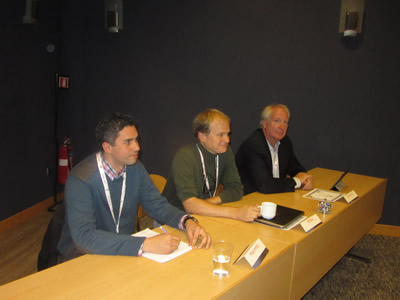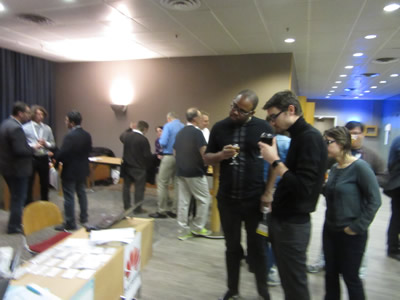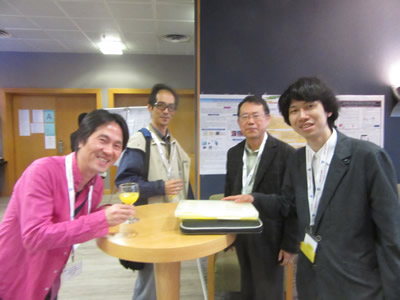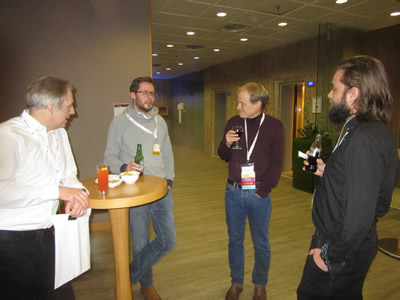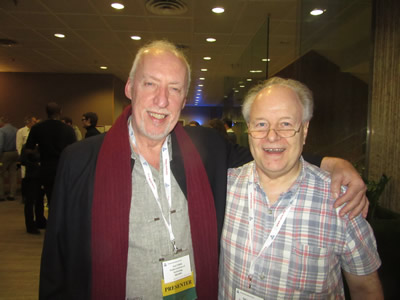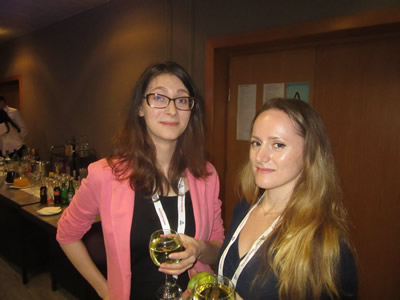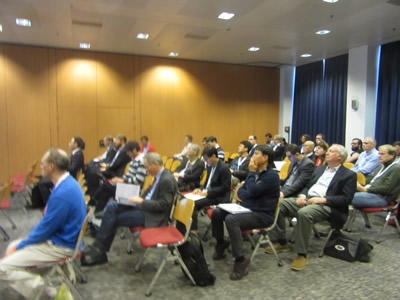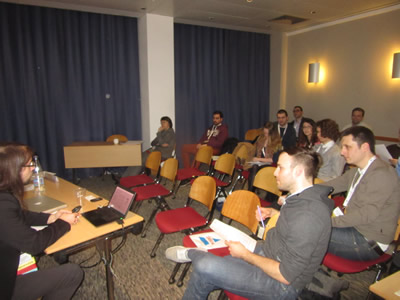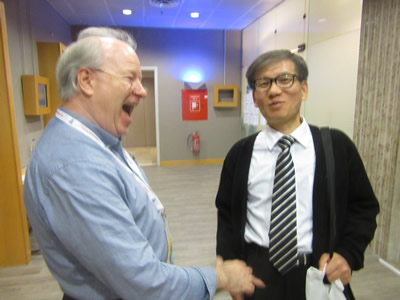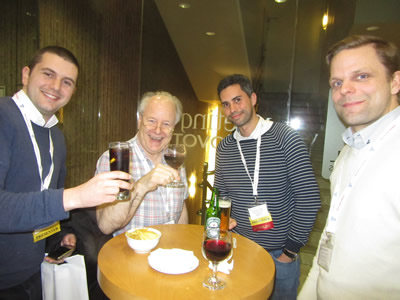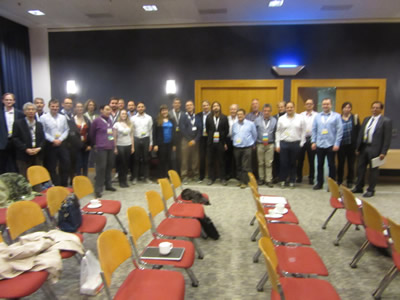SEMAPRO 2018 - The Twelfth International Conference on Advances in Semantic Processing
November 18, 2018 - November 22, 2018
SEMAPRO 2018: Call for Papers
The inaugural International Conference on Advances in Semantic Processing, SEMAPRO 2007, was initiated considering the complexity of understanding and processing information. Semantic processing considers contextual dependencies and adds to the individually acquired knowledge emergent properties and understanding. Hardware and software support and platforms were developed for semantically enhanced information retrieval and interpretation. Searching for video, voice and speech [VVS] raises additional problems to specialized engines with respect to text search. Contextual searching and special patterns-based techniques are current solutions.
With the progress on ontology, web services, semantic social media, semantic web, deep web search /deep semantic web/, semantic deep web, semantic networking and semantic reasoning, SEMAPRO 2018 constitutes the stage for the state-of-the-art on the most recent advances.
We solicit both academic, research, and industrial contributions. We welcome technical papers presenting research and practical results, position papers addressing the pros and cons of specific proposals, such as those being discussed in the standard fora or in industry consortia, survey papers addressing the key problems and solutions on any of the above topics short papers on work in progress, and panel proposals.
Industrial presentations are not subject to the format and content constraints of regular submissions. We expect short and long presentations that express industrial position and status.
Tutorials on specific related topics and panels on challenging areas are encouraged.
The topics suggested by the conference can be discussed in term of concepts, state of the art, research, standards, implementations, running experiments, applications, and industrial case studies. Authors are invited to submit complete unpublished papers, which are not under review in any other conference or journal in the following, but not limited to, topic areas.
All topics and submission formats are open to both research and industry contributions.
SEMAPRO 2018 conference tracks:
Basics on semantics
Fundamental of semantics processing; Semantic-based techniques for feature selection; Semantic-based pruning; Semantic interoperability; Semantics uncertainty; Semantics pre-processing and post-processing; Semantics harmonization; Constraint-based semantics processing; Embedded semantics into the discovery process; Semantics in spatial and spatio-temporal models
Ontology fundamentals for semantic processing
Ontology learning; Ontology for semantic interoperability; Ontologies and data pre-processing; Ontology-based evaluation and semantic patterns; Global core ontologies; Progressive ontologies; Bridging semantics through ontologies; Ontology mapping and ontology visualization; Ontology in information systems; Ontology-based semantic mediation; Ontology design and maintenance for conceptual model integration; Reverse engineering of ontologies from conceptual model; Ontologies for explanation generation
Semantic technologies
Basics of Ontology and Semantic Web; Semantic storing, computing, representation, communications; Semantic-driven system design; Syntactic and semantic processing models; Hardware and software support for semantic processing; Microprocessors for semantic processing; Multi-model semantic systems; Semantic annotation of multimedia supports; Semantic multimedia information retrieval; Natural language semantic processing; Context-based semantic processing; Content-based semantic processing; Scalability to the Web level; Performance in semantic processing; Information security in semantic processing; Explaining semantic processing and its results
Models and ontology-based design of protocols, architectures and services
Fundamentals in theory; Modeling methodologies; Models and Ontology-driven Technologies (for the communications system design); Models and ontology relationships; Multi-models coherence. Models and ontology-based communications services and protocols; Semantics of services and service modeling; Protocol models and semantics; Application and quality of experience semantics; Services and protocols semantics; Models and ontology-based cross-layer services and architectures design; Models and ontology-based software frameworks; Composition of Services and Composability rules; Cross-layering services models, components and implementations
Semantic Deep Web
Ontology plug-in search; Information extraction from the Deep Web /e-commerce sites/; Semantic Deep Web annotation and indexing; Deep Web-based ontology; Semantic Deep Web crawlers; Semantic browsing and visualization; Semantic Deep Web data fusion; Semiautomatic ontology generation; Metrics for quality of ontology; Similarity measures for ontology alignment; Measurements for quality of search; Tools for semantic Deep Web; Experience extraction from the Web
Semantic reasoning
Reasoning methods; Reasoning for the Web; Ontology expressiveness; Ontology alignment, mapping and merging; Expressing formal semantics; Languages (RDF, RDF Schema, OWL, etc); Robustness of reasoning on the Web; Patterns on semantic reasoning; Querying and searching; Scalable and tolerant reasoning; Dynamic reasoning for the Semantic Web; Ontologies and problem-solving methods; Computational learning theory; Approximate reasoning/computing; Strategies for abstraction and compression of information; Cognitive semantic reasoning; Attention semantic scoping; Recency-based self-optimizing memory; Cost-benefit trade-off reasoning models; Negotiation in obtaining near-optimal reasoning results under bounded resources; Case-based reasoning
Semantic content searching
Methodologies for innovative information retrieval technologies; Combinatorial search; Massive search-spaces with heuristics (e.g., based on Monte Carlo simulations); Searching using metadata, semantics, and ontology; Advanced searching in digital libraries; Advanced use of RDF and OWL; Expressiveness of the content ontologies; Inherent inconsistency and incompleteness of data on the Web; Scalability of semantic processing; Specialized search engines (Hakia, Matrixware and seekda)
Hypertext and hypermedia semantic
Hypertext techniques and semantic applications; Hypertext and ontologies; Hypertext semantic models; Spatial semantic hypertext; Self-organized hypertext; Semantic adaptive hypertext; Web and hypertext link analysis; Hypertexts and semantic Web; Hypertext semantic applications
Semantic voice-video-speech (VVS) searching
Engines and methods for VVS advanced searching; Patterns in VVS searching; Contextual VVS searching; Rapid VVS searching; Accuracy in VVS searching; Noise in VVS searching; Performance in VVS searching; Metrics for VVS searching; Text and VVS searching; Applications of VVS
Semantic multimedia
Efficient storage of structured data that scale to a very large size; Automatic generation of multimedia presentations; Advanced process for multimedia information mining; Semantic metadata extraction; Annotation tools and methods for content semantics; Media ontology generation/learning/reasoning; Semantic multimedia streaming; Semantics enabled multimedia applications /annotation/browsing/storage/retrieval/visualization
Semantic social media
Community detection and evolution in social media; Recommendation and ranking systems; Search in social media; Event detection, trend identification and tracking in social media; Influence, trust and reputation in social media; Opinion/sentiment analysis, polarity identification; Feed distillation and ranking blogs; Mining microblogging and real time data; Folksonomy, tag semantics, clustering and usage; Advertising models for the social web; Indexing social media content, index freshness; Visualizing social network data; Spam detection, social network spam and profile spam
Semantics for sentiment/opinion analysis
Architectures for generic sentiment analysis systems; Sentiment analysis techniques on social media; Document-level analysis; Sentence-level analysis; Aspect-based analysis; Comparative-sentiment analysis; Sentiment lexicon acquisition; Optimizing sentiment analysis algorithms; Applications of sentiment analysis
Semantic networking
Semantic-based QoS (Quality of Service) control and scheduling; Semantic QoE (Quality of Experience) evaluation; Semantic-based Internet data streaming and delivery; Semantics enabled networking and middleware; Semantic routing; Semantic interfaces
Domain-oriented semantic applications
Semantics for managing pharmaceutical data; Semantic processing for biomedical knowledge; Speech, text and picture recognition; Semantic email workflow and content; Semantic blogs and wikis; Semantic email addressing; Semantic web and digital libraries; Semantic processing in e-Health; Semantic-driven tutoring systems
Economics and governance of semantics technologies
Organizational views; Legal; Business; Regulations; Assessment; Standards; Harmonization; Cross-nation mediation
Semantic applications/platforms/tools
Market for semantic technologies; Applications, services and systems based on semantic processing; User friendly semantic system integration tools; Ontology-based data transformation and data migration tools; Ontology mapping tools and languages; Ontology-enabled interoperability in e-science, life sciences, e-business, culture; Commercial cost models for semantic applications; Semantic solutions for business intelligence; Semantic processing platforms ; Supporting ontology platforms/tools (Protégé, etc); Semantic query languages (SPARQL, etc); Ontology-enabled search engines; Semantic Web search engines; Interoperability of data, systems, and organizations; Experiments and lessons learned; Standard activities
Deadlines:
Submission | Aug 01, 2018 |
Notification | Sep 04, 2018 |
Registration | Sep 17, 2018 |
Camera ready | Sep 25, 2018 |
Deadlines differ for special tracks. Please consult the conference home page for special tracks Call for Papers (if any).
INSTRUCTION FOR THE AUTHORS
Authors of selected papers will be invited to submit extended versions to one of the IARIA Journals.
Publisher: XPS (Xpert Publishing Services)
Archived: ThinkMindTM Digital Library (free access)
Prints available at Curran Associates, Inc.
How to submit to appropriate indexes.
Only .pdf or .doc files will be accepted for paper submission. All received submissions will be acknowledged via an automated system.
Contribution types
- regular papers [in the proceedings, digital library]
- short papers (work in progress) [in the proceedings, digital library]
- ideas: two pages [in the proceedings, digital library]
- extended abstracts: two pages [in the proceedings, digital library]
- posters: two pages [in the proceedings, digital library]
- posters: slide only [slide-deck posted on www.iaria.org]
- presentations: slide only [slide-deck posted on www.iaria.org]
- demos: two pages [posted on www.iaria.org]
FORMATS
Only .pdf or .doc files will be accepted for paper submission. All received submissions will be acknowledged via an automated system.
Final author manuscripts will be 8.5" x 11", not exceeding 6 pages; max 4 extra pages allowed at additional cost.
Helpful information for paper formatting for MS Word can be found here.
There is a community provided LaTeX template: the CTAN package iaria (with full IARIA formatting rules, including IARIA citation style, but for providing citation style it is tightly bound to pdflatex+biblatex+biber). In addition, there is also iaria-lite (not bound to pdflatex+biblatex+biber, but compatible with any TeX stack; thus, it cannot provide the IARIA citation formattings, but only the titlepage and content-related IARIA formatting rules). Based on the iaria package, there is a minimal working example as Overleaf template. When you are using the LaTeX templates, please still adhere to the additional editorial rules.
Slides-based contributions can use the corporate/university format and style.
Your paper should also comply with the additional editorial rules.
Once you receive the notification of contribution acceptance, you will be provided by the publisher an online author kit with all the steps an author needs to follow to submit the final version. The author kits URL will be included in the letter of acceptance.
We would recommend that you should not use too many extra pages, even if you can afford the extra fees. No more than 2 contributions per event are recommended, as each contribution must be separately registered and paid for. At least one author of each accepted paper must register to ensure that the paper will be included in the conference proceedings and in the digital library, or posted on the www.iaria.org (for slide-based contributions).
CONTRIBUTION TYPE
Regular Papers (up to 6-10 page article -6 pages covered the by regular registration; max 4 extra pages allowed at additional cost- ) (oral presentation)
These contributions could be academic or industrial research, survey, white, implementation-oriented, architecture-oriented, white papers, etc. They will be included in the proceedings, posted in the free-access ThinkMind digital library and sent for indexing. Please submit the contributions following the instructions for the regular submissions using the "Submit a Paper" button and selecting the appropriate contribution type. 12-14 presentation slides are suggested.
Short papers (work in progress) (up to 4 pages long) (oral presentation)
Work-in-progress contributions are welcome. These contributions represent partial achievements of longer-term projects. They could be academic or industrial research, survey, white, implementation-oriented, architecture-oriented, white papers, etc. Please submit the contributions following the instructions for the regular submissions using the "Submit a Paper" button and selecting the contribution type as work in progress. Contributors must follow the conference deadlines, describing early research and novel skeleton ideas in the areas of the conference topics. The work will be published in the conference proceedings, posted in the free-access ThinkMind digital library and sent for indexing. For more details, see the Work in Progress explanation page. 12-14 presentation slides are suggested.
Ideas contributions (2 pages long) (oral presentation)
This category is dedicated to new ideas in their very early stage. Idea contributions are expression of yet to be developed approaches, with pros/cons, not yet consolidated. Ideas contributions are intended for a debate and audience feedback. Please submit the contributions following the instructions for the regular submissions using the "Submit a Paper" button and selecting the contribution type as Idea. Contributors must follow the conference deadlines, describing early research and novel skeleton ideas in the areas of the conference topics. The work will be published in the conference proceedings, posted in the free-access ThinkMind digital library and sent for indexing. For more details, see the Ideas explanation page. 12-14 presentation slides are suggested.
Extended abstracts (2 pages long) (oral presentation)
Extended abstracts summarize a long potential publication with noticeable results. It is intended for sharing yet to be written, or further on intended for a journal publication. Please submit the contributions following the instructions for the regular submissions using the "Submit a Paper" button and selecting the contribution type as Extended abstract. Contributors must follow the conference deadlines, describing early research and novel skeleton ideas in the areas of the conference topics. The work will be published in the conference proceedings, posted in the free-access ThinkMind digital library and sent for indexing. 12-14 presentation slides are suggested.
Posters (paper-based, two pages long) (oral presentation)
Posters are intended for ongoing research projects, concrete realizations, or industrial applications/projects presentations. The poster may be presented during sessions reserved for posters, or mixed with presentation of articles of similar topic. A two-page paper summarizes a presentation intended to be a POSTER. This allows an author to summarize a series of results and expose them via a big number of figures, graphics and tables. Please submit the contributions following the instructions for the regular submissions using the "Submit a Paper" button and selecting the contribution type as Poster Two Pages. Contributors must follow the conference deadlines, describing early research and novel skeleton ideas in the areas of the conference topics. The work will be published in the conference proceedings, posted in the free-access ThinkMind digital library and sent for indexing. 8-10 presentation slides are suggested. Also a big Poster is suitable, used for live discussions with the attendees, in addition to the oral presentation.
Posters (slide-based, only) (oral presentation)
Posters are intended for ongoing research projects, concrete realizations, or industrial applications/projects presentations. The poster may be presented during sessions reserved for posters, or mixed with presentation of articles of similar topic. The slides must have comprehensive comments. This type of contribution only requires a 8-10 slide-deck. Please submit the contributions following the instructions for the regular submissions using the "Submit a Paper" button and selecting the contribution type as Poster (slide-only). The slide-deck will be posted, post-event, on www.iaria.org.
8-10 presentation slides are suggested. Also a big Poster is suitable, used for live discussions with the attendees, additionally to the oral presentation.
Presentations (slide-based, only) (oral presentation)
These contributions represent technical marketing/industrial/business/positioning presentations. This type of contribution only requires a 12-14 slide-deck. Please submit the contributions following the submission instructions by using the "Submit a Paper" button and selecting the contribution type as Presentation (slide-only). The slide-deck will be posted, post-event, on www.iaria.org.
12-14 presentation slides are suggested.
Demos (two pages) [posted on www.iaria.org]
Demos represent special contributions where a tool, an implementation of an application, or a freshly implemented system is presented in its alfa/beta version. It might also be intended for thsoe new application to gather the attendee opinion. A two-page summary for a demo is intended to be. It would be scheduled in special time spots, to ensure a maximum attendance from the participants. Please submit the contributions following the submission instructions by using the "Submit a Paper" button and selecting the contribution type as Demos. The Demos paper will be posted, post-event, on www.iaria.org.
Tutorial proposals
Tutorials provide overviews of current high interest topics. Proposals should be for 2-3 hour long. Proposals must contain the title, the summary of the content, and the biography of the presenter(s). The tutorial slide decks will be posted on the IARIA site.
Please send your proposals to tutorial proposal
Panel proposals
The organizers encourage scientists and industry leaders to organize dedicated panels dealing with controversial and challenging topics and paradigms. Panel moderators are asked to identify their guests and manage that their appropriate talk supports timely reach our deadlines. Moderators must specifically submit an official proposal, indicating their background, panelist names, their affiliation, the topic of the panel, as well as short biographies. The panel slide deck will be posted on the IARIA site.
Please send your proposals to panel proposal

